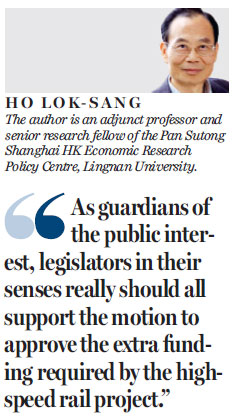Lawmakers should offer constructive criticisms and advice to government
Updated: 2016-03-15 09:08
By Ho Lok-sang(HK Edition)
|
|||||||||
I have written earlier in this column affirming that in Hong Kong there is separation of powers among the executive, the judiciary, and the legislative functions. Given that separation of powers is alive and well, legislators certainly are not accountable to the executive branch. They are accountable to Hong Kong people at large and they are there to offer constructive criticisms and advice to the SAR government. Legislators thus are not there to rubber stamp everything proposed by the executive. Today, legislators are all either popularly elected or elected by their functional constituencies. They are there to guard and to further the interests of the public. Even legislators from functional constituencies should be accountable to the public. Ideally, their functional constituency background should enrich discussions in the Legislative Council, so that such discussions will not lose sight of some important perspectives. Being accountable to people who voted them into office would be too narrow a perspective.
As guardians of the public interest, legislators in their senses really should all support the motion to approve the extra funding required by the high-speed rail project. It is now clear that the original arrangement with the MTR Corporation (MTRC) over the financing and management of this project was flawed. It did not give sufficient incentive for the MTRC to hold its contractors responsible for delays and for cost overruns. Pointing out the problems, suggesting what may be done to avert future problems, criticizing officials responsible for poor management, etc, are all well justified. But blocking the extra funding and halting the project when it is more than three-quarters complete is not. Expecting a "Yes" vote from all legislators in this instance is not asking them to rubber stamp everything proposed by the executive. It is simply that this is the only sensible action to take.
Halting the project when it is three-quarters completed is simply unthinkable. The extra funding is HK$19.6 billion. Although this is still a big amount, it is small compared to what has already been spent, and the MTRC is now fully required to ensure the project's completion without asking for more funding. When the project is completed, it will become part of the national high-speed rail system and will enhance the competitiveness of the Hong Kong economy. If the project is halted now, on the other hand, we will not have the high-speed rail, and then we will have to build alternative links to the mainland. This is because the existing rail link is already used to its capacity and because traffic is expected to grow. The high-speed rail is expected to divert traffic from the current railway line, so that even those who do not use newer railway will benefit, because the old railway lines will then be less congested, and booking of seats will be easier.
The greatest problem is that should the high-speed rail project be halted now, the damage to Hong Kong's reputation will be unbearable. Costly lawsuits from contractors may follow. Future infrastructure projects may be at risk of becoming more costly as potential bidders factor in the possibility of shortage of funds. If legislators are forward-looking, they should be more proactive in helping the government work out contract arrangements with relevant parties so that their responsibilities are more transparent and there will be sufficient supervision and monitoring of the projects. Calling the high-speed rail project a white elephant is not responsible, because it is not.
Legislator Cyd Ho Sau-lan offered her apology to the Hong Kong public for failing to safeguard their interests in the face of "institutional violence". She said the "pan-democrats" had done all they could to block the passage of the funding request. Perhaps an apology from the legislators to the public is due - but not because they eventually failed to block the approval of the extra funding. If an apology is due, it is because they failed to advise the government as to a better contractual arrangement with the MTRC in the first place, so that the MTRC could not be held responsible for the cost overrun. The "pan-democrats" say they are now considering applying for judicial review of the case. I sincerely hope that they will not take this forward, as it will not serve any purpose.
Legislators have a responsibility to "assist" the government. This is not to say they need to accede to everything the government proposes, because that is not really useful assistance. Thwarting poor judgment and bad decisions from the government would be useful though. The design of separation of powers is so legislators can be more effective in assisting the government.

(HK Edition 03/15/2016 page10)